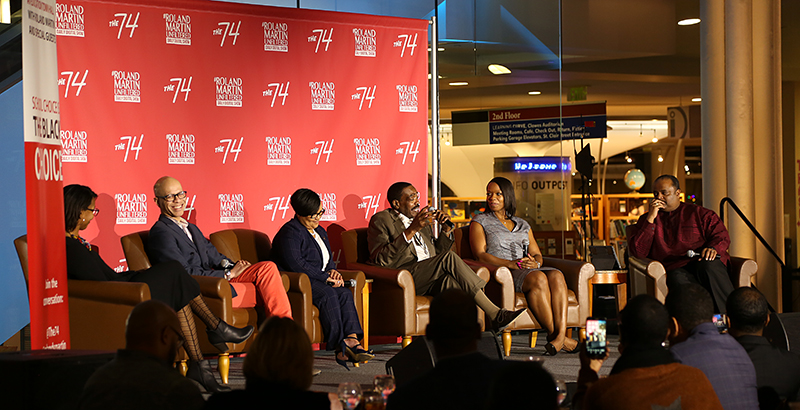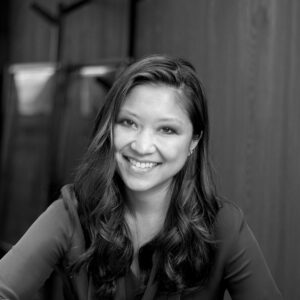‘School Choice Is the Black Choice’: Roland Martin Kicks Off Education Tour With Indianapolis Town Hall, Tough Questions About School Innovation & the Achievement Gap

INDIANAPOLIS
Broadcast journalist Roland Martin turned up the heat in the heart of America’s Crossroads Sunday night, pushing local and national education leaders at a packed town hall on the city’s sluggish performance in improving black student achievement despite heavy reforms.
The flexibility Indiana offers to families is unprecedented. In the last 10 years, the state has launched and maintained programs like the Tax Credit Scholarship and the Indiana Choice Scholarship, both of which seek to offer low- and middle-income families the opportunity to send their children to non-neighborhood and tuition-based schools. A 2011 report by the Center for Research on Education Outcomes at Stanford University found that the students in Indiana charter schools make dramatically larger learning gains compared to those in traditional public schools.
In Indianapolis Public Schools alone, there are traditional public schools, charter schools, or an Innovation Network Schools, which seek to offer curricula more tailored to each school’s student body.
“Indy has a whole lot of cooks in the education kitchen,” Martin said, arguing that as a result, the system is convoluted and not effectively serving the city’s black students.
None of the city’s schools — whether traditional public, innovation, or charter — are yielding stellar results in black student achievement. On this year’s statewide exams, just 24.5 percent of black students in grades 3-8 passed both the English and math tests, compared with 58 percent of their white peers and 50.7 percent of the state’s students overall. Black students in Indiana also have the highest likelihood of attending a D or F school. For every one black student who is proficient in math and ELA, there are three who are not.
But Aleesia Johnson, deputy superintendent of academics for Indianapolis Public Schools, said that neither the type of school, nor the existence of several different types, is the problem.
“I don’t think it’s the fact that they’re different structures that they’re not working. You can look at a public or private school through the lens of how black children are doing, and I don’t think anyone is going to say we’re knocking it out of the park in the United States of America,” Johnson said. “If we stop only at choice, as black folks, we’re missing the boat. It is convoluted, but it’s easy to get sucked into this war of, ‘What [type of school] are you?’ versus the conversation of, ‘Is this a quality school?’ I think the convolution can be a gift if we can figure out how to shift the conversation to that part.”
Martin and Johnson’s remarks were part of the mainstage panel for “School Choice Is the Black Choice: Indianapolis,” the first event in a 10-city tour hosted by Martin and The 74. The tour seeks to engage black families and stakeholders on issues of educational equity, student achievement, and parent involvement. Sunday’s event attracted nearly 300 attendees at the central Indianapolis Public Library.
“This is about pushing you to create a movement, not just a moment,” Martin said to the audience. “What do we do next? The decisions we make today with education are going to impact your children’s children. This is a multigenerational theme.”
Also on the panel were Derrell Bradford, executive vice president of the school reform organization 50CAN; Candace Pate, director of admissions and community partnerships at Providence Cristo Rey High School in Indianapolis, a Catholic school; Kelli Marshall, CEO of Tindley Accelerated Schools, a charter network; and education consultant George Parker.
While achievement scores are mixed across the city’s traditional public and choice schools, Johnson said student success is all about how it’s measured beyond test scores, including progress and intangible metrics like whether students feel safe and loved at school — all areas in which certain city schools are doing well, she said.
Some of those successful schools have been replicated, but doing so quickly and at scale is challenging with finite resources, Johnson said.
And while Indiana high schoolers of color are graduating at higher rates than ever before, large gaps remain in postsecondary enrollment and college readiness, according to a 2018 report from the Indiana Commission for Higher Education.
Across racial groups, black students in Indiana are the least prepared for college, the report said. Just one in four of the state’s black students meet standards for early college success, including course completion, persistence beyond freshman year, and not needing to take remedial courses.
Pate recognized organizations like EdFit and EdChoice that already organize and do advocacy work in the community, “but people have to show up.”
Also critical to educational equity efforts in the city is the presence of more African-American leaders, or, as Marshall put it, that “those in the position of making decisions need to start resembling more of us.”
Martin recommended that the community organize educators, advocates, and families to centralize efforts by way of a steering committee or black education alliance.
“There are education stakeholders here, but folks are frankly doing their own thing and operating in silos,” he said. “If you can change Indianapolis, you can change Indiana. If you can change Indiana … you can change the country. But it can only happen if you operate as a collective.”
National partners for the event include the American Federation for Children, EdChoice, ExcelinEd, the National Alliance for Public Charter Schools, the United Negro College Fund, and the Walton Family Foundation.
Disclosure: The Walton Family Foundation provides financial support to The 74.
Get stories like these delivered straight to your inbox. Sign up for The 74 Newsletter

;)
